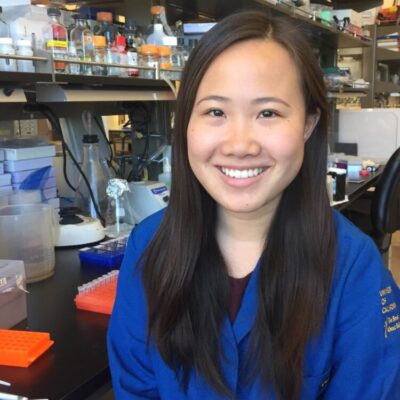Claudia Chan Rose Hills
The role of miR-200 in regulating self-renewing cancer stem cells in Kras lung adenocarcinomas
Lung cancer is the leading cause of cancer deaths worldwide, with non-small-cell lung cancer (NSCLC) accounting for nearly 80% of the cases. Adenocarcinomas are the most prevalent type of NSCLC among which Kras is the most commonly found mutation that correlates with poor patient prognosis. In our mouse model carrying this oncogenic Kras mutation allele and the inducible loss-of-p53 allele, tumor progression, histopathology, and molecular characteristics are similar to those of the human disease, allowing us to understand basic lung tumor biology and identify markers for early diagnosis.
In this project, I will focus on studying the role of microRNA family miR-200 in lung cancer tumorigenesis and progression by loss-of-function experiments. There are preliminary results showing that miR-200s are downregulated specifically in lung tumor metastases in comparison to primary tumors in our Kras mouse model. Mice losing miR-200 developed lung tumors with larger size and higher tumor grade as well as lymph node and distant metastases. I am interested in understanding the underlying molecular mechanisms by which the loss of miR-200 affects the tumor propagating cell (TPC) population, also known as cancer stem cells. It has been proposed that tumors are often derived from TPC populations with properties of either self-renewal or differentiation, and that the more TPCs there are, the higher grade the tumors are. With our preliminary results of miR-200 as a tumor suppressor, I hypothesize that the loss of miR-200 promotes tumor metastasis by impacting TPCs and promoting their self-renewal capabilities. My methodological approach is to examine whether or not there is any change in TPC abundance in our loss-of-miR-200 cancer model and then to determine the signaling pathways that contribute to miR-200-loss-regulated TPC proliferation.
Message To Sponsor
I am so honored to have been chosen as a SURF Rose Hills Fellow and to be a part of a cohort of such intelligent and passionate undergraduate researchers. I would like to thank the Rose Hills Foundation for their generosity in allowing me to conduct full-time research in Berkeley this summer. This opportunity is incredibly valuable, as I will be able to think critically about my research, design my own experiments and assays, and troubleshoot accordingly. It will allow me to experience what being a scientist is truly about, and to apply what I have learned in the classroom to an actual laboratory setting. I would also like to thank my mentors Bin Xue and Lin He as well as the rest of the He Lab for their guidance and support!